


| MOQ: | 1kg |
| Price: | US $2/kg |
| Standard Packaging: | Cylinder/Tank |
| Delivery Period: | 15 days |
| Payment Method: | L/C, T/T |
| Supply Capacity: | 50000kg/month |
Ethylene gas (C2H4) is a colorless, flammable gas that serves as a plant hormone and is also used in various industrial applications. Ethylene is naturally produced by plants as part of their growth and development processes. It plays a significant role in regulating plant physiology and is involved in processes such as fruit ripening, flowering, senescence (aging), and response to stress. In addition to its natural occurrence, ethylene gas can also be produced synthetically for industrial purposes. Here are some key points about ethylene gas:
Plant Hormone: Ethylene acts as a plant hormone, signaling molecule, and regulator of various physiological processes in plants. It influences the growth and development of plants, including seed germination, stem elongation, leaf and flower senescence, fruit ripening, and abscission (the shedding of leaves, flowers, or fruits).
Ripening Agent: Ethylene is commonly used as a ripening agent for fruits. When applied in controlled environments or added to fruit storage areas, it accelerates the natural ripening process. This is particularly important for fruits that require ethylene to initiate or enhance the ripening process, such as bananas, tomatoes, and avocados.
Industrial Applications: Ethylene gas is utilized in various industrial applications:
Petrochemical Industry: Ethylene is a crucial raw material in the petrochemical industry. It serves as a building block for the production of numerous chemicals, including polyethylene (the most widely used plastic), ethylene oxide, ethylene glycol, vinyl chloride, and many others.
Plastics and Polymers: Ethylene is a key component in the production of various plastics and polymers. It is used in the synthesis of polyethylene, which has a wide range of applications in packaging, containers, pipes, and many other products.
Chemical Synthesis: Ethylene serves as a starting material for the synthesis of various chemicals, including ethanol, ethylene oxide (used in the production of detergents, solvents, and plastics), and acetaldehyde (used in the manufacturing of resins, dyes, and other chemicals).
Safety Considerations: Ethylene gas is flammable and should be handled with care. It can form explosive mixtures with air, so precautions must be taken to prevent the accumulation of flammable concentrations and to minimize the risk of ignition. Proper storage, handling, and ventilation practices should be followed when working with ethylene gas.
It's important to note that while ethylene gas has various industrial applications, its use as a plant hormone for fruit ripening or other agricultural purposes is typically regulated and requires careful application to ensure optimal results and safety.
Basic Info.
| Model No: | C2H4 | Transport Package | Cylinder |
| Specification: | 40L | Trademark | CMC |
| Origin: | Suzhou | HS Code | 2812190091 |
| Production Capacity: | 5000 Tons Per Month |
Specification:
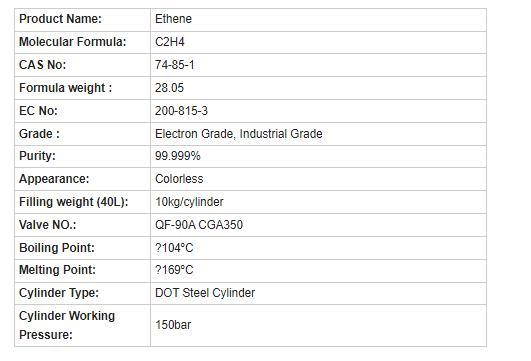
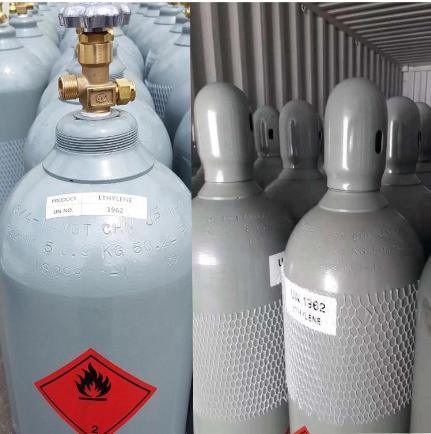
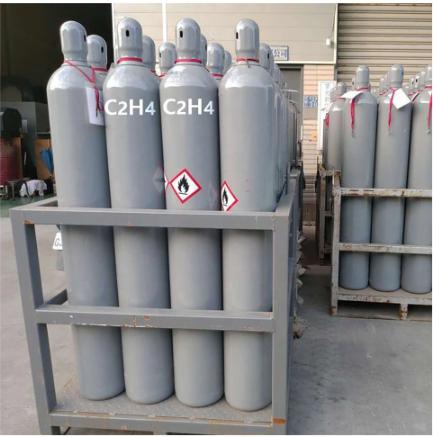
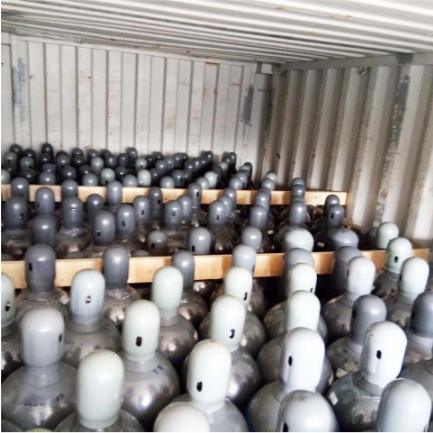
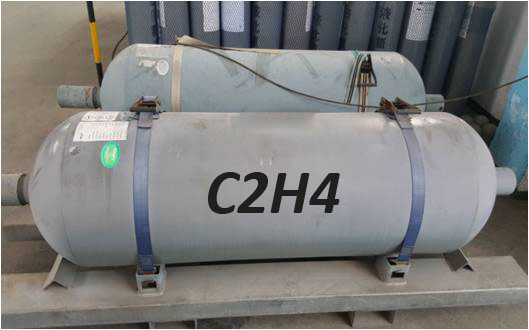




| MOQ: | 1kg |
| Price: | US $2/kg |
| Standard Packaging: | Cylinder/Tank |
| Delivery Period: | 15 days |
| Payment Method: | L/C, T/T |
| Supply Capacity: | 50000kg/month |
Ethylene gas (C2H4) is a colorless, flammable gas that serves as a plant hormone and is also used in various industrial applications. Ethylene is naturally produced by plants as part of their growth and development processes. It plays a significant role in regulating plant physiology and is involved in processes such as fruit ripening, flowering, senescence (aging), and response to stress. In addition to its natural occurrence, ethylene gas can also be produced synthetically for industrial purposes. Here are some key points about ethylene gas:
Plant Hormone: Ethylene acts as a plant hormone, signaling molecule, and regulator of various physiological processes in plants. It influences the growth and development of plants, including seed germination, stem elongation, leaf and flower senescence, fruit ripening, and abscission (the shedding of leaves, flowers, or fruits).
Ripening Agent: Ethylene is commonly used as a ripening agent for fruits. When applied in controlled environments or added to fruit storage areas, it accelerates the natural ripening process. This is particularly important for fruits that require ethylene to initiate or enhance the ripening process, such as bananas, tomatoes, and avocados.
Industrial Applications: Ethylene gas is utilized in various industrial applications:
Petrochemical Industry: Ethylene is a crucial raw material in the petrochemical industry. It serves as a building block for the production of numerous chemicals, including polyethylene (the most widely used plastic), ethylene oxide, ethylene glycol, vinyl chloride, and many others.
Plastics and Polymers: Ethylene is a key component in the production of various plastics and polymers. It is used in the synthesis of polyethylene, which has a wide range of applications in packaging, containers, pipes, and many other products.
Chemical Synthesis: Ethylene serves as a starting material for the synthesis of various chemicals, including ethanol, ethylene oxide (used in the production of detergents, solvents, and plastics), and acetaldehyde (used in the manufacturing of resins, dyes, and other chemicals).
Safety Considerations: Ethylene gas is flammable and should be handled with care. It can form explosive mixtures with air, so precautions must be taken to prevent the accumulation of flammable concentrations and to minimize the risk of ignition. Proper storage, handling, and ventilation practices should be followed when working with ethylene gas.
It's important to note that while ethylene gas has various industrial applications, its use as a plant hormone for fruit ripening or other agricultural purposes is typically regulated and requires careful application to ensure optimal results and safety.
Basic Info.
| Model No: | C2H4 | Transport Package | Cylinder |
| Specification: | 40L | Trademark | CMC |
| Origin: | Suzhou | HS Code | 2812190091 |
| Production Capacity: | 5000 Tons Per Month |
Specification:







